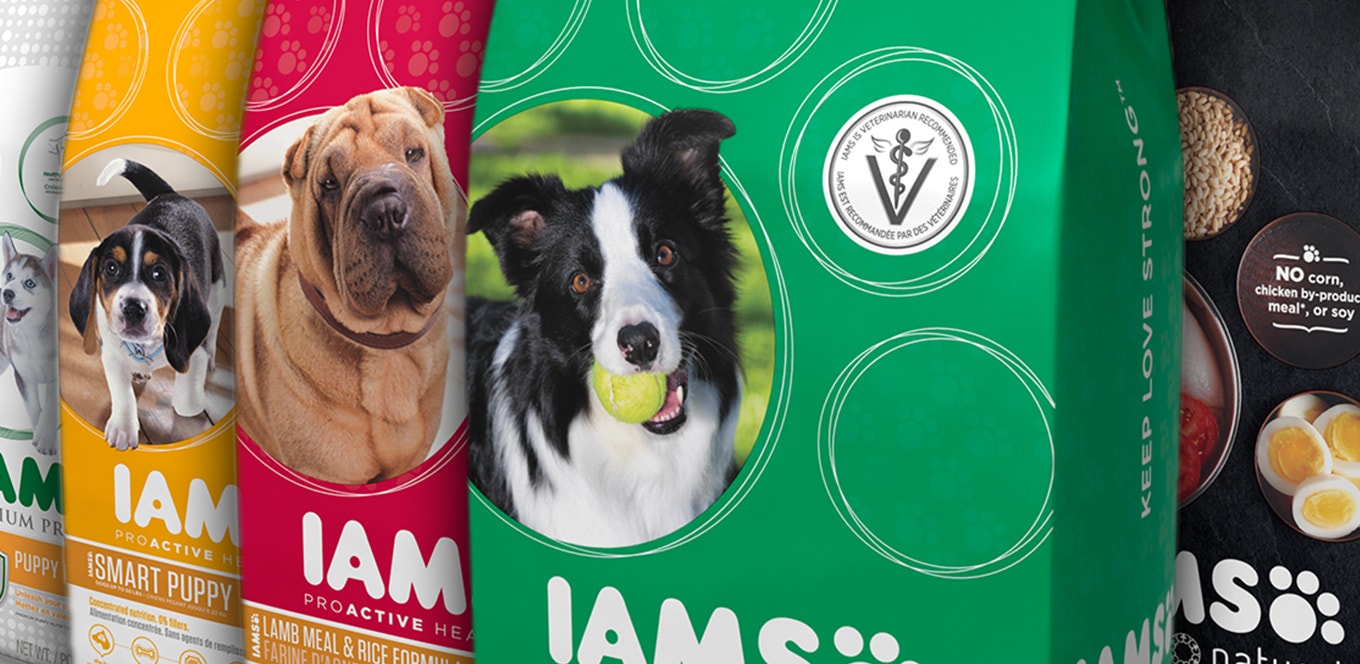

Good nutrition is as important to your dog’s health as it is to your own. But with thousands of different pet foods available, how do you pick the right one for your dog?
Learn how to choose a dog food that provides the proper, balanced nutrition your dog needs to thrive with these six tips.
In general, while a human diet should be high in fiber and low in fat, a dog needs more fat for energy and a healthy skin and coat, and less fiber for good intestinal health.
Preferably, a dog’s food should include meat, too. Even if you prefer a vegetarian diet, designing a high-quality dog diet without animal protein is difficult. IAMS™ Company research supports that meatless meals might not provide optimal nutrition for dogs. Dogs are best fed as carnivores because they have simple stomachs and short intestines that are ideal for digesting animal protein and animal fat. Dogs also need carbohydrates for energy.
Start by identifying your dog’s life stage and lifestyle. Puppies, nursing mothers and mature pets each represent different life stages, and each one has different nutritional requirements. By law, all dog foods must state the life stage for which they are recommended.
Nutritional needs also vary depending on lifestyle. A dog whose primary activity is guarding the couch doesn’t need as much energy as one who guards a flock of sheep. Another factor to consider is breed size: small, medium or large.
Finally, consider medical conditions your dog has, such as food allergies, that might require your veterinarian to recommend a special diet.
Once you’ve determined your dog’s life stage and lifestyle needs, decide whether to feed him dry or canned food. Most dogs do well eating only dry food. Dry foods promote oral hygiene for healthy teeth and gums through abrasive chewing action. Some dogs, especially finicky eaters, enjoy wet food because of its smooth, wet texture.
Remember that while dry food can be left in a bowl all day, wet food should be thrown away after 30 minutes if not consumed. Dry food is the best choice for busy people who are not normally home during the day.
After you determine your pet’s nutritional needs and preference, you are ready to go shopping.
Ingredients on dog-food labels are listed in descending order according to weight. Because dogs thrive on animal-based diets, it’s best to pick a food that features an animal-based protein source, such as chicken, lamb, fish or egg, as the first ingredient. Unlike a single-vegetable-based protein source, such as soybean meal or corn-gluten meal, animal-based protein sources contain adequate amounts of essential amino acids.
Scientific studies show that a combination of carbohydrates in the diet, such as corn meal or barley and grain sorghum, offers optimal carbohydrate digestibility and helps maintain energy levels. In addition, scientific studies show that beet pulp — the material remaining after sugar is extracted from sugar beets — is an excellent fiber source and promotes a healthy digestive tract. Finally, for a glossy coat and healthy skin, your pet needs fat in the diet. Good fat sources include chicken fat and fish oil.
Dog-food labels provide limited information about the nutritional value of the food because labeling regulations do not allow manufacturers to describe the quality of ingredients on the package.
A reputable pet-food manufacturer will be able to explain their specific methods for evaluating and assuring the quality of ingredients used in its products.
When choosing food, the price on the bag, while important, is usually not the best consideration. A low price might indicate inexpensive ingredients, or ingredients that change as market prices fluctuate.
Also, many lower-priced products have higher daily portions to provide the same amount of nutrition found in a high-quality diet. To get a better representation of value, it is the cost per feeding, not the total cost, that counts.
To figure cost per feeding, divide the total cost by the number of days the product lasts. For example, a 20-pound bag of food costs $18.99 and lasts 30 days. The cost to feed is $0.63 per day. A 20-pound bag of food that costs $15.99 and lasts 20 days costs $0.80 per day. So, when costs are analyzed properly, high-quality pet foods compare quite favorably to other brands while offering outstanding nutrition.




Some dog parents encounter the challenge of dealing with a finicky eater, where their furry friend becomes selective or hesitant about their meals. Understanding the underlying reasons for this behaviour is crucial in ensuring the well-being and health of these cherished pets. In this article, we delve into the various factors that contribute to a dog's picky eating habits, exploring potential psychological, physiological, and environmental triggers.
Is your dog a picky eater? A dog's temporary loss of appetite can stem from various factors, including changes in the environment, mild illness, stress, or even the weather. While occasional appetite fluctuations are typical, prolonged refusal to eat can lead to serious health complications. It is essential for pet parents to pay close attention to their dog's eating habits, considering it as an indicator of their overall health. If a dog consistently refuses meals or shows disinterest in food, it is imperative to consult a veterinarian to rule out any underlying medical conditions.
According to veterinary experts, animal eating disorders are more common than people think. Anorexia in animals, defined as a loss of appetite, can manifest in two forms. The first kind involves a refusal to eat and is often linked to severe illness, and the other is where dogs want to eat but encounter difficulties in chewing, picking up, or swallowing food. In clinical settings, a diagnosis of anorexia is established when a dog consistently refuses to eat or displays a significant change in eating habits. The concern is heightened, particularly when a dog with a history of healthy eating habits suddenly loses interest in food.
A dog not eating properly can stem from various causes ranging from physical health to behavioural problems. Some of such reasons are listed below:
Some dogs prioritise attention or playtime over meals, leading to a lack of interest in food. Acknowledging their preferences and creating a relaxed feeding environment, such as feeding them in a quiet spot away from distractions, can promote healthier eating habits. Engaging in interactive play sessions or providing affectionate interactions before mealtime can also help stimulate their appetite and encourage a more positive association with food.
If a dog is a picky eater, it can be because it associates the food with past negative experiences, such as an upset stomach or digestive issues. Introducing alternative, more appealing food options that are gentle on their stomach can help dissociate negative memories and encourage a return to regular eating patterns. Gradually introducing these new foods alongside familiar ones can also help build their confidence and trust in trying different meals.
Dogs, like humans, can experience appetite loss due to various stressors, including separation anxiety, changes in routine, or environmental stressors like loud noises or unfamiliar surroundings. Creating a comforting environment by providing a cosy and safe space, along with soothing background noises or calming scents, can help alleviate stress and improve their eating habits.
A dog not eating food can be indicative of underlying health issues such as dental problems, digestive issues, or systemic illnesses. Regular check-ups and close monitoring of any changes in their eating behaviour are crucial for early detection and effective treatment. Observing other accompanying symptoms like lethargy, weight loss, or changes in bathroom habits can provide valuable information for the vet to conduct a thorough examination and diagnostic tests to identify any potential health concerns.
Dogs, like humans, can develop preferences for certain flavours or textures, leading them to reject their current food. Gradually introducing new food options guided by a veterinarian can help identify more appealing alternatives that align with their nutritional needs. Understanding their taste preferences and incorporating a balanced and varied diet that includes different protein sources and textures can not only stimulate their appetite but also ensure they receive essential nutrients for optimal health.
Overindulgence in treats can lead to a reduced appetite for regular meals, as dogs may fill up on treats and not feel the need to consume their main meals. Limiting the amount of treats given to only training sessions or as occasional rewards for good behaviour can encourage a healthier mealtime routine. Using healthier treat alternatives such as small pieces of fruits or vegetables can also provide added nutrients and prevent the negative effects of excessive treat consumption, promoting a more balanced diet overall.
Dogs can become bored with repetitive meal offerings, leading to a lack of interest in eating. Adding variety to their diet, such as incorporating canned food, meal toppers, or rotating different protein sources, can enhance meal appeal and stimulate their appetite. At IAMS, we offer a variety of dog food in different flavours that are not only yummy but also nutritious. With our Proactive Health dog food range, you can hit two birds with a stone – cater to the discerning taste of a finicky eater and meet its dietary needs.
Sharing human food with dogs can lead to overfeeding and disrupt their regular meal schedules, as they may fill up on extra calories and lose their appetite for their designated meals. Establishing clear boundaries and avoiding feeding table scraps can regulate their calorie intake and prevent unnecessary weight gain. Providing appropriate portion sizes based on their size and dietary requirements, along with a well-balanced diet, can help maintain their ideal weight and prevent any gastrointestinal discomfort caused by excessive or inappropriate human food consumption.
Dogs thrive on consistency and routine, and irregular meal schedules can disrupt their eating patterns and cause confusion. Establishing a fixed feeding schedule and offering meals at the same time each day, along with a designated feeding area, can reinforce a structured feeding routine that they can anticipate and rely on. Setting a specific time limit for meal consumption and removing any uneaten food after that period can prevent overeating and encourage them to finish their meals within the allocated time, promoting healthy and balanced eating habits.
Persistent appetite loss, despite various interventions, may indicate complex health concerns that require professional veterinary attention and diagnostic testing. Consulting a veterinarian for a complete assessment and tailored treatment plans is essential for identifying any underlying health issues affecting their appetite. Diagnostic procedures such as blood tests, imaging scans, or dietary trials may be recommended to pinpoint any physiological or medical factors contributing to their decreased appetite. With proper medical intervention and management, underlying health issues can be addressed effectively, ensuring their overall well-being, and restoring their normal eating patterns.
Keeping a close eye on your dog's eating habits is crucial for maintaining its overall health and well-being. Any significant changes in its appetite, such as sudden or prolonged refusal to eat, should not be overlooked, as it can indicate underlying health issues or emotional distress. Regular monitoring of its eating patterns, along with prompt veterinary consultation in case of continued appetite loss, can help identify and address any potential concerns early on. Maintaining a balanced diet, providing a stress-free environment, and ensuring a consistent feeding routine can contribute to their overall nutritional health and promote a positive relationship with food.
If your dog is a picky eater, navigating through its diet can be a challenge because of the various reasons associated with it. Understanding the possible causes can help you tailor your approach to encourage them to eat more consistently. It's essential to consider factors such as changes in their environment, health concerns, dietary preferences, or even behavioural issues that may be influencing their eating habits. Experimenting with different food textures and flavours, maintaining a stable feeding routine, and minimising stress during mealtime can help address a dog’s picky eating. Seeking guidance from a veterinarian or animal behaviourist can provide valuable insights and strategies to manage their selective eating habits effectively.
Understanding the intricacies of a dog's eating habits is vital for its overall well-being and health. Regular monitoring of its appetite, maintaining a balanced diet, and creating a stress-free feeding environment can contribute significantly to their nutritional health. Additionally, addressing any sudden changes in their eating behaviour promptly and seeking veterinary guidance when necessary is crucial for identifying underlying health issues or emotional distress. With a tailored approach that considers various factors influencing a dog’s eating habits, pet parents can effectively manage picky eating behaviours and ensure their beloved companions receive the necessary care and attention to maintain a healthy and fulfilling lifestyle.